History of Employment Law in the United States
 Workers today have many legal protections that help prevent discrimination, harassment, and mistreatment. When people in the Sacramento, CA area have been mistreated by your employer, they know they can turn to the legal team at ThybergLaw.
Workers today have many legal protections that help prevent discrimination, harassment, and mistreatment. When people in the Sacramento, CA area have been mistreated by your employer, they know they can turn to the legal team at ThybergLaw.
The history of American employment law goes back decades, with many strides made during the 20th century. Gregory A. Thyberg and his attorneys would like to consider a brief overview of key legislation that has impacted American employment law and worker protections.
FDR and The New Deal
While many strides were made to improve the lives of workers, it really wasn’t until the Great Depression that the need for sweeping legislation was necessary to lift up the lives of all Americans. With so many people struggling, President Franklin Delano Roosevelt promised a “New Deal,” which would involve labor reforms, financial regulations, and the creation of a social safety net to help so many people struggling and suffering.
We can credit the New Deal with creating many of the programs crucial for American life today, including social security and unemployment benefits. We’ll highlight two key laws from this period regarding employment laws and worker rights, but note that there were many other state and federal bills regarding labor that were passed around this time as well.
The National Labor Relations Act of 1935
Considered one of the foundational statutes in American labor law, the National Labor Relations Act of 1935 guarantees the rights of private sector workers to organize and form unions, to engage their employers in collective bargaining for better working conditions and wages, and to take collective action such as striking. In the decades leading up to this law, there was much legal argument about the Constitutionality of unions and organization.
The Fair Labor Standards Act of 1938
The Fair Labor Standards Act of 1938 helped establish the right to a minimum wage for workers, the 40-hour work week, and the right to overtime pay for any labor done in excess of 40 hours in the work week. In addition, the FLSA also prohibited child labor for dangerous or harmful types of jobs.
The Equal Pay Act of 1963
The Equal Pay Act of 1963 was passed as an amendment to the FLSA, designed to abolish the gender pay gap between men and women in the United States. While women are still making less money than men on the whole for their work, the Equal Pay Act and the cultural zeitgeist have helped continue to narrow this gap.
The Civil Rights Act of 1964
The fight for civil rights throughout the 1950s and 1960s meant a battle for basic human decency in the face of racism and bigotry, a struggle that continues today. The Civil Rights Act of 1964 helped move the country toward greater justice and equality by outlawing discrimination. With regard to employment specifically, the Civil Rights Act prohibited discrimination on the grounds of race, color, religion, sex, or national origin.
The Age Discrimination in Employment Act of 1967
To help fight age discrimination and ageism at the workplace, the Age Discrimination in Employment Act of 1967 was signed into law. This offered legal protections for employees and workers age 40 and older.
The Pregnancy Discrimination Act of 1978
Pregnant women in the workplace were often discriminated against, and still face a number of issues at work. Their rights as workers are protected in part by the Pregnancy Discrimination Act of 1978, which prohibits sex discrimination on the basis of a woman being pregnant.
The Americans with Disabilities Act of 1990
Even though the rights of women, people of color, and other marginalized groups were addressed by various labor laws in the 20th century, the rights of people with disabilities would not be enshrined in law until the century drew to a close. The Americans with Disabilities Act of 1990 helped protect people with disabilities at their workplaces. The legislation outlined reasonable accommodations employers could make as well as improving overall accessibility to various kinds of facilities for people living with a disability.
Contact ThybergLaw
For more information about your legal rights as an employee, be sure to contact the employment rights attorneys at our law firm. We are here to help you in your time of legal need. You can reach ThybergLaw by phone at (916) 204-9173.


